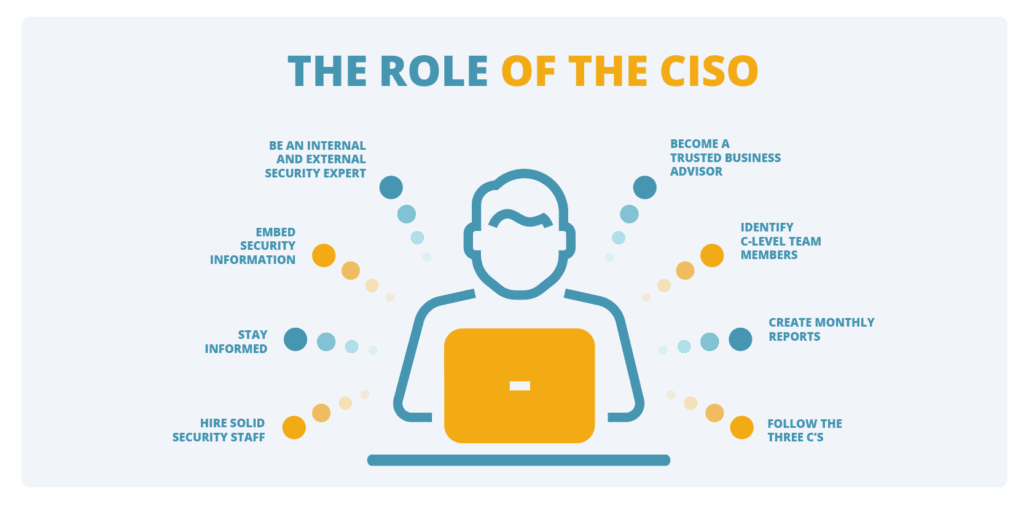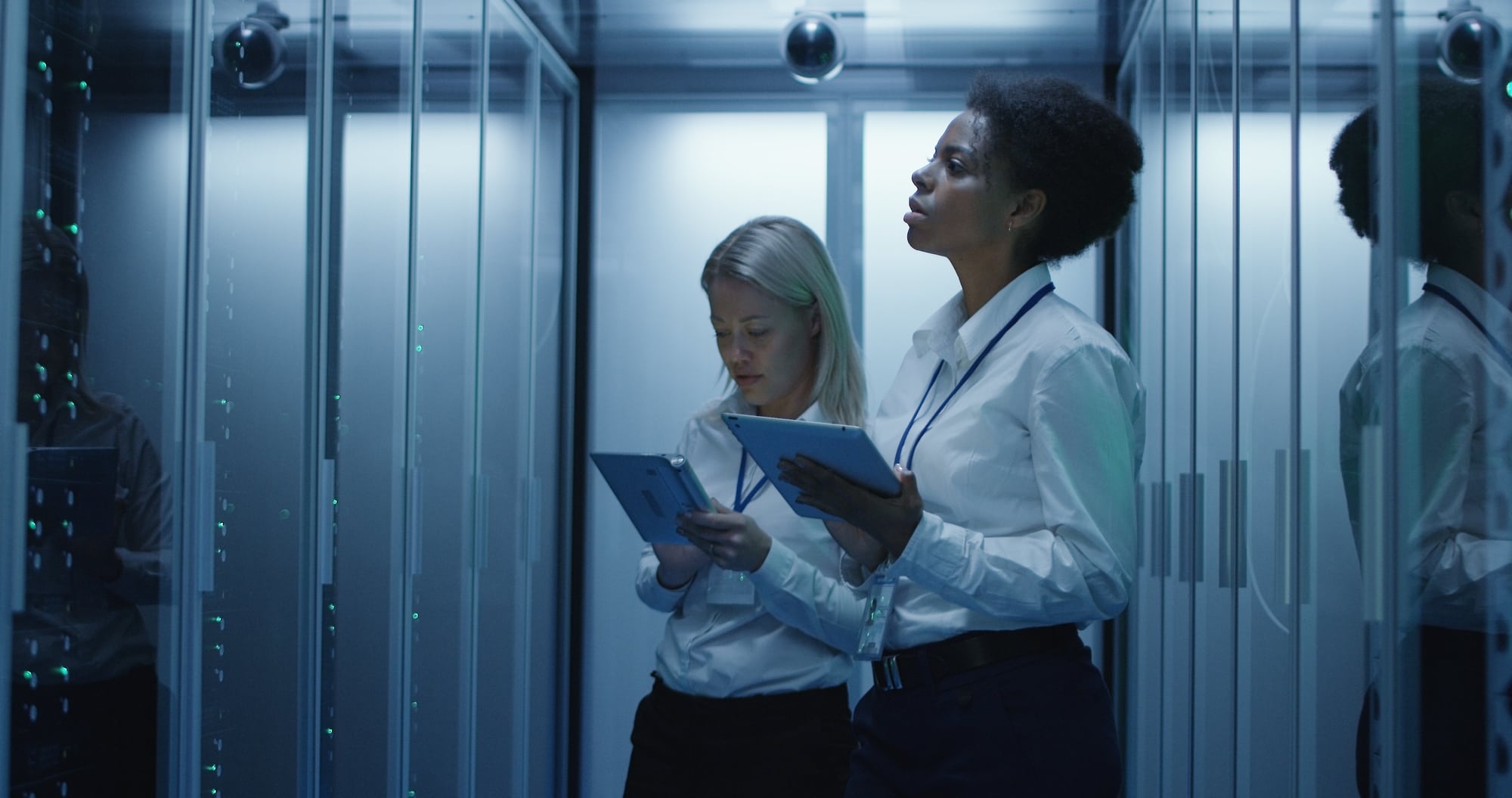Today, organizations of all sizes recognize the importance of maintaining a secure infrastructure and building strong cybersecurity practices. Following the ever-evolving landscape of cyber threats, companies need to rely upon security professionals to protect their sensitive data. Many organizations are turning to the services of a virtual Chief Information Security Officer, also known as a vCISO.
A vCISO is a senior-level security professional that provides consulting, assessment, and recommendations to meet the specific needs of an organization. Their services provide a cost-effective way to supplement a company’s existing in-house security team. vCISOs help bridge the gap between the daily operations of the business with the security risks and threats associated with managing a digital environment.
What is a vCISO: vCISO meaning
A vCISO is a senior-level security professional that provides consulting, assessment, and recommendations to meet the specific needs of an organization. A vCISO serves as an external leader, utilizing their extensive industrial expertise to improve an organization’s security posture.
vCISOs are proficient at aligning security controls with business strategies. They can consolidate policies, standards, regulations, etc. based on the nature and location of the business.
vCISOs help bridge the gap between the daily operations of the business with the security risks and threats associated with managing a digital environment. Their services provide a cost-effective way to supplement a company’s existing in-house security team. vCISOs are now needed more than ever to lead an organization in the face of evolving information security concerns.
What is the Difference Between a CISO and a Virtual CISO?
A CISO and a vCISO both play important roles to improve the information security in an organization. However, there are a few differences between the two roles as summarized below.
- The terms of employment are different.
A CISO is a full-time, in-house position, whereas a vCISO is a part-time, contractual, or on-demand service.
A CISO is an employee of the organization and is dedicated solely to the business entity. On the other hand, a vCISO is usually not a direct employee and can serve multiple organizations in the capacity of a vCISO.
- The cost incurred for a CISO and a vCISO is different.
Hiring a CISO is usually more expensive than hiring a vCISO. The hiring cost of a CISO includes salary, benefits, taxes, and other overheads.
On the other hand, hiring a vCISO is more cost-effective since it does not entail employment benefits and overheads. Thus, hiring a vCISO can be a good option for SMBs or startups with lower budgets.
- A CISO might be more involved in the organization compared to a vCISO.
A CISO being a full-time member of the executive team is deeply involved in the organization and its operations. They would demonstrate a higher level of understanding of the organizational culture and business strategies.
A vCISO might not have the same level of involvement in the organization. However, their external perspective can often be useful to provide unbiased insights and advice.
What Services Does a vCISO Render?
The vCISO provides an added layer of protection to an organization by offering guidance and insight on best practices in security technology and operational security, helping them stay ahead of the ever-evolving cyber threat landscape. So, what services does a vCISO provide?
- Virtual CISOs Provide Executive Advice to Firms
Risk Assessment: The vCISO will assess the organization’s current risk posture and develop a risk management strategy to ensure that the organization is meeting industry standards.
Security Strategy Development: The vCISO will work with the executive team to develop a security strategy that is tailored to the organization’s needs.
Security Program Operations: The vCISO will oversee the operations of the security program and ensure that changes are implemented in a timely and cost-effective manner.
- Virtual CISOs Provide Security Engineering
Review of Security Standards & Policies: The vCISO will review the organization’s current security standards and policies and ensure that they are compliant with industry best practices.
Security Architecture Design: The vCISO will develop a comprehensive security architecture that takes into account organizational needs and industry standards.
Network & Security Operations: The vCISO will ensure that the organization’s network and security operations are up-to-date and aligned with the organization’s strategy.
- Security Testing Services are Provided by vCISOs
Vulnerability Assessments: The vCISO will perform vulnerability assessments to identify and address weaknesses in the organization’s security infrastructure.
Vulnerability Remediation: The vCISO will work with the organization to remediate any identified vulnerabilities.
Hersey Testing: The vCISO will conduct Hersey testing to ensure that the organization’s security processes are resistant to malicious activity.
- vCISOs Help Organizations to Achieve Security Compliance
Regulatory & Industry Compliance: The vCISO will ensure that the organization is compliant with all relevant laws and regulations.
Audits: The vCISO will coordinate and manage all security audits to ensure that the organization’s processes are up to date.
Business Continuity Planning: The vCISO will develop and implement plans to ensure that the organization can continue its operations during a time of crisis or disruption.
To further prove this point, let’s look at the CISO’s role on both the security and compliance sides of organization operations:
End-to-End Security Operations
- Evaluating the IT threat landscape
- Developing policies and controls to reduce risk
- Security awareness and training
- Overseeing controls related to networks, cloud applications, servers, endpoint and infrastructure
Management
- Verification checks for job candidates
- Ensure incident management processes are in place
- Auditing vulnerability management
- Leading auditing and compliance
Documentation
- Compliance
- Governance
- Management & HR
- Cybersecurity policy and procedures
Recovery & Business Continuity
- Guaranteeing cyber backups are in place
- Analyzing cyber incident response plan
- Implementing a cyber resilience framework
Related article: How to Simplify Cybersecurity Efforts.
When do you Need a vCISO?
Should you hire a virtual CISO or a full-time, in-house CSO? When does it make sense to hire a vCISO? Getting answers to this question might seem a little difficult. Below are some of the scenarios when it would be a good idea to hire a vCISO.
- There are budget constraints in the organization.
In the current threat landscape, cybersecurity and information security are critical to any business. And you need a strong, experienced leader to drive the security strategy. But hiring a CISO can be expensive.
You can hire a vCISO at a fraction of the cost. You also have the flexibility of hiring someone remotely, further reducing the costs involved.
- The organization is an SMB or a startup.
Small or medium businesses or startups might not need the services of a full-time CISO. However, they would still need someone to drive their information security initiatives. This is where vCISOs can be a good choice.
vCISOs can help you lay the groundwork for information security best practices and give direction to enhanced infosec and cybersecurity.
- The organization is going through rapid growth or changes.
When an organization is going through changes, it makes sense to make information security practices a part of these changes. However, it would need a leader with decision-making capabilities to interweave information security in the business strategy. A vCISO can help achieve this on an ad-hoc basis.
- The organization needs extra help to enhance its security posture.
A vCISO can bring fresh perspectives and insights to the table. They can help identify security gaps that might otherwise be overlooked. Moreover, if you have a niche requirement, you can hire a vCISO that can help in specific areas of concern and complement the existing team.
A vCISO can also be helpful in giving a boost to an organization’s security culture. They can drive initiatives to improve awareness and education about security among employees.
- The organization needs to demonstrate security compliance.
A vCISO who specializes in regulatory compliance can be helpful in demonstrating compliance with a standard, framework, or legislation. With their expertise, they can help to implement controls and policies to adhere to complex guidelines.
What Are the Benefits of a vCISO?
Hiring a vCISO can bring several benefits to an organization as summarized below.
- Cost-benefit: Hiring a vCISO can be significantly more cost-effective than hiring a full-time CISO.
- Flexibility: There is no long-term commitment to hiring a vCISO. This gives more flexibility in terms of scaling up or down the services of a vCISO and customizing the services according to specific needs.
- Experience and expertise: vCISOs with extensive experience and expertise can bring tremendous value to a security program. From their diverse experiences, they can bring innovative solutions and best practices.
- Fast deployment: The hiring cycle for a full-time CISO can be longer. Instead, a vCISO can quickly come on board to meet urgent needs.
- Able leadership: When a vCISO takes over driving the security strategy, the other members of the executive team can focus on the core business strategy, leaving decisions related to infosec in able hands.
- Security-first culture: A vCISO can help foster a security-centric culture by bringing in more awareness and educating the stakeholders.
Why vCISOs Are in High Demand?
A virtual CISO has many of the same responsibilities as a traditional CISO, but with the advantage of being able to access resources, such as security and privacy professionals, without having to hire in-house. It is particularly beneficial for businesses with limited budgets who may not be able to afford the high salaries and overhead costs associated with a full-time CISO. Additionally, the virtual CISO model enables companies to have access to specialist IT security experts and experienced professionals who can offer advice and support on an as-needed basis.

The vCISO model is also a great way for businesses to take advantage of new security technologies, or quickly respond to changing compliance requirements. A vCISO will be able to assess the organization’s security landscape quickly and take the initiative to implement necessary security changes or upgrades. They can think outside the box and come up with new ideas on how to better protect your business from security threats.
Overall, the virtual CISO model offers companies flexibility and access to the latest security technologies without the same associated financial commitment. By leveraging the services of an experienced virtual CISO, companies can alleviate some of the stress associated with managing their digital security and privacy initiatives while still ensuring the safety of their data and customers.
Why Hire a Virtual CISO?
When recruiting a vCISO, there are a few things to consider. First and foremost, hire someone who has the right experience and certification. While experience is essential, look for someone whose skills also match the needs of the organization. For example, if the organization has a larger IT network, look for someone who is familiar with more advanced security protocols. The vCISO should also be invested in the organization’s security mission. Engagement and enthusiasm among vCISOs are essential, as they will be the driving force behind the organization’s security strategy and execution.
Find someone who has a proven track record of success and is highly interested in developing the organization. Another important factor is to determine the type of services you’ll need. For example, will the vCISO develop policies and procedures? Will they help with incident response and disaster recovery? Will they create security awareness campaigns? It’s crucial to understand the vCISO’s skill set and the services that they can offer. Finally, think about the cost and budget. A vCISO typically charges an hourly rate, so make sure that the organization is comfortable with the rate. Also, consider any project-level fees that may be incurred.
Having an experienced vCISO on your organization’s staff can provide tremendous value in securing your infrastructure, data, and mission-critical resources. vCISOs will analyze the risk, suggest and implement security controls, and ensure that the organization is informed and educated on the most current security practices. So, if you’re thinking about investing in a vCISO to help protect your business, you’re making the right choice.
How Much Does it Cost to Hire a vCISO?
The cost of hiring a vCISO can vary based on factors. Some of these include:
- Experience of the vCISO
- Expertise of the vCISO
- Scope of the services needed
- Size and complexity of the organization
- Industry of the organization
- Duration of engagement
- Complexity of the information security needs
- Nature of services (remote or offline)
Given below are the pricing models with approximate rates.
- Hourly pricing – $200 to $250 per hour
- Monthly retainer model – $1,600 to $20,000
- Project-based pricing – $5,000 to $10,000 per project
- Equity model – Equities can be offered in addition to other pricing or as a sole offering and depends on the company’s share prices and/or available equity
How to Hire a vCISO?
Hiring a vCISO is an important business decision. Here are a few things you should consider while choosing the right person to lead information security at your organization.
- Identify business needs: Define clearly what you need to meet business goals. Also consider factors such as current cybersecurity maturity level, compliance requirements, and specific areas of concern.
- Define the scope of the work: Identify areas where you will need inputs from the vCISO. Also, determine the virtual CISO responsibilities and what the expected deliverables would be (status reports, check-ins, availability, etc.).
- List down skills to look out for: vCISOs can come with diverse experiences, expertise, and skill sets. It helps to narrow down the required skills to make the right choice.
- Evaluate suitable candidates: During the evaluation phase, consider their previous experience, qualifications, certifications, and expertise. Also, look for good cultural fit and communication skills.
- Decide on the terms of engagement: Once you finalize the right candidate, you can decide on the terms of engagement including how their performance would be measured throughout the engagement.
The steps in hiring the right vCISO might sound complex and time-consuming. However, with the AWA vCISO services, you can drastically reduce the time and effort needed to choose the right candidate to head information security at your organization.
AWA simplifies the process of hiring a vCISO by connecting you to suitable candidates. With years of experience in security consulting across various industries, we have the right tools to shortlist the best-matched vCISO profiles that meet your specific requirement. Request a free quote here.







